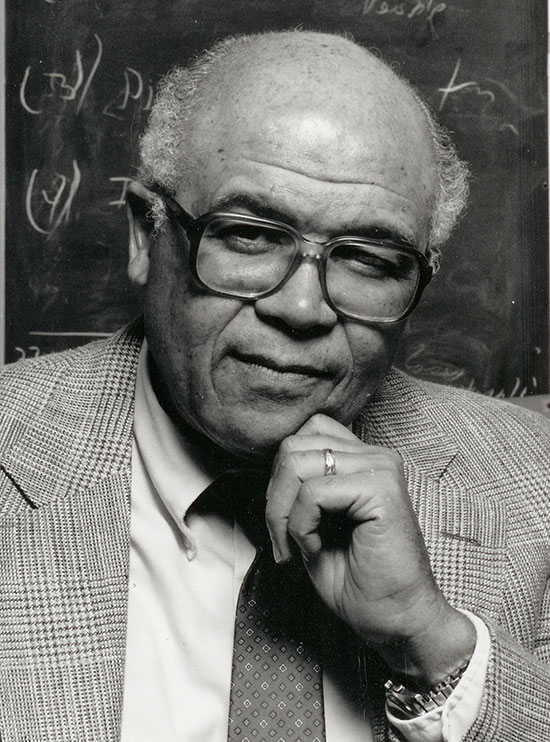Honoring James Jones: U.W. Law School’s First Black Law Professor
 In “Remembering Wisconsin’s Black Lawyers” (Wisconsin Lawyer, May 2019), Celia M. Jackson reported that the Wisconsin Association of African-American Lawyers was compiling a history of Black lawyers in Wisconsin. Among the memories told in the article, Jackson wrote about James Jones, U.W. Law School’s first Black law professor.
In “Remembering Wisconsin’s Black Lawyers” (Wisconsin Lawyer, May 2019), Celia M. Jackson reported that the Wisconsin Association of African-American Lawyers was compiling a history of Black lawyers in Wisconsin. Among the memories told in the article, Jackson wrote about James Jones, U.W. Law School’s first Black law professor.
Jackson asked that readers help recount the history of Wisconsin’s Black lawyers by sharing their stories. A reader recently told the following:
Reader: I had the true privilege to have taken Prof. Jones’ labor law class in about 1990. I’ll admit, I found the particular textbook for that class hard to follow, causing me to struggle in seeing the big picture of labor law. But, without exception, it was always a delight to enter Prof. Jones’ classroom, where not only did he pick up the slack left off by the textbook, but his lectures and his give and take with the students were always lively, entertaining, and, given his genuine good nature and enthusiasm, always left me leaving his class in a better mood.
In an effort to buoy his students’ spirits as we slogged through challenging and sometimes tedious coursework, he reminded us that, yes, lawyering could at times be sheer drudgery, but that there would always be those moments of engagement, excitement, and the chance to face down a challenge that were “so sweet” that it made the hard work worth it.
Finally, because I was underconfident in my ability to fully command the material due to the hard-to-follow textbook, labor law was one of the two classes that I took “pass/fail.” I passed. The next semester, I walked by Prof. Jones in the hallway. He stopped me flat and asked if I had taken his class “pass/fail,” to which I responded that I did. Showing his fun, mischievous, yet benevolent side, he chuckled heartily and said, “Oh boy, that is a shame, because you probably attained the highest score you ever achieved in law school,” continuing to chortle as he walked away.
My takeaways from that conversation were that 1) Prof. Jones’ fun lectures helped make up for a poor textbook, which I should have realized and then taken a straight grade; and 2) I should approach any task, even one that is at first blush seemingly difficult to surmount, with more confidence and gusto. I’ve tried to take his kind advice to heart. Thanks, Professor.
Allen M. Ratkowski
Hills Legal Group Ltd., Franklin
We Want to Hear from You! Submit a Letter to the Editor
Wisconsin Lawyer provides a forum for members to express ideas, concerns, and opinions on law-related subjects. Send comments to wislawyer@wisbar.org (include “Letters” in the subject line), or mail to Wisconsin Lawyer “Letters,” P.O. Box 7158, Madison, WI 53707-7158. Limit to 500 words. Writing guidelines available.
Connect With Us Online. Post comments to articles
online, and find us on Facebook, Twitter, LinkedIn, YouTube, and Instagram.
Inadequate SPD Funding Has Real-life Consequences

In “Appeals Court Orders Dismissal after Indigent Defendant Jailed 3+ Months Without Counsel” (Wisbar Court Review, Jan. 22, 2021), Joe Forward wrote that although Wisconsin law requires a court to hold a preliminary hearing within 10 days after an initial appearance for those in custody on alleged felony charges, Nhia Lee – an indigent defendant – was in jail for 113 days before his hearing.
Lee remained in custody with no lawyer to represent him because the State Public Defender could not find private counsel to take his case. The statutory 10-day deadline for holding a preliminary hearing was repeatedly extended for this reason. Ultimately, the Marathon County Circuit Court denied a motion to dismiss the case based on the circumstances of Lee’s extended custody.
In State v. Lee, 2021 WI App 12, a three-judge panel for the District III Court of Appeals reversed and remanded the case with directions to dismiss.
A reader weighed in:
Reader: Over the past 40 years, the legislature has destroyed the criminal justice system by starving it to death. Through inaction, they allowed the rate paid to private bar members to stagnate at $40 per hour, about one-third the rate paid to auto mechanics. The result has been that as the decades rolled on, fewer and fewer of the “best and the brightest” went into criminal defense as an occupation. Now, even though the rates have gone up, there simply are not enough competent young people to take on the caseloads across the state.
It took 40 years for this mess to develop, and it will likely take even longer than that to correct the problem. Expect massive violations of constitutional rights in the coming decades.
Hans Koesser
Koesser Law Office SC, Kenosha
Inmates Held to Higher Standard for Enrollment in Early Release Program

In “Appeals Court: Early Release Not an Option for OWI Defendant, 7th Offense” (InsideTrack, Nov. 17, 2020), Joe Forward explained that a state appeals court decision in State v. Gramza, 2020 WI App 81, 395 Wis. 2d 215, 952 N.W.2d 836, resolves an apparent conflict between a statute requiring a mandatory prison term for operating while intoxicated (OWI) (seventh offense) offenders and a statute that allows early release upon successful completion of a treatment program.
After pleading guilty to a seventh-offense OWI, Gramza received the sentence of a minimum of three years in prison, plus three years’ extended supervision, under Wis. Stat. section 346.65(2)(am)6. The court also ordered Gramza’s eligibility for a substance abuse program while in prison. He successfully completed the program within six months.
A subsequent request from the Wisconsin Department of Corrections to modify the sentence to convert Gramza’s remaining prison time to extended supervision, in accordance with Wis. Stat. section 302.05, was denied.
A reader posted a comment:
Reader: They violated 302.05, but what’s worse is this judge did not have the authority to impair the obligation of a contract. That’s what an earned release program (ERP) is – a contract between an inmate and the state. The service provided by the state is reform, and the payment from the inmate is good behavior and cooperation. They are held to a higher standard in order to be enrolled in an ERP.
Richard B. Jacobson
Richard B. Jacobson & Associates LLC, Madison
